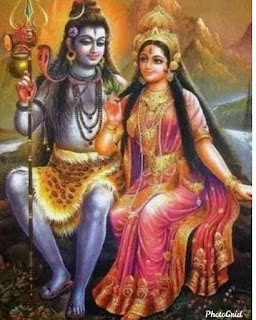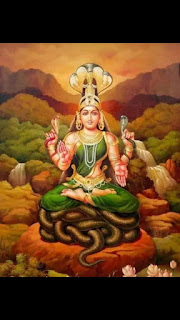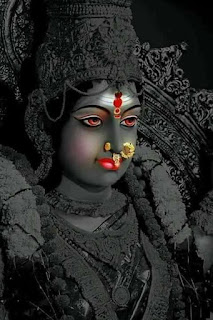सुमेरु-मध्य-शृङ्गस्था (55)
Sumeru-madhya-śṛṅgasthā
From this nāma till 63, the narration of Her abode begins.
Sumeru means in the midst of mountains called meru. She lives in the centre of Meru Mountains. Possibly this could be the description of Śrī Cakrā.
श्रीमन्-नगर-नायिका (56)
Śrīman-nagara-nāyikā
She owns this auspicious and wealthy city called Śrī Nagara.
चिन्तामणि- गॄहान्तस्था (57)
Cintāmaṇi-gṛuhāntasthā
She lives in a palace constructed out of Cintāmaṇi, one of the most valuable gems. This gem is supposed to give whatever is desired. This palace is on the northern side of Śrī Nagara, the city. All the gods and goddesses go to this place to worship Her. This is supposed to be the place of origin of all mantra-s.
पञ्च-ब्रह्मासन-स्थिता (58)
Pañca-brahmāsana-sthitā
She is seated on a throne made up of five Brahmans. The five Brahmans are Brahma, Viṣṇu, Rudra, Īśāna and Sadāśiva.
महापद्माटवी-संस्था (59)
Mahāpadmāṭavī-saṃsthā
She dwells in a great forest full of lotus flowers. Lotus flower grows only in water. Nature’s bounty has been mentioned here. Big mountains with high peaks were referred earlier. Now indirectly the water bodies are mentioned. Mahāpadma also refers to a type of elephant.
कदंबवन-वासिनी (60)
Kadaṃbavana-vāsinī
She lives in the middle of kadaṃba trees whose flowers have divine fragrance. Her Cintāmaṇi graha is surrounded by a forest of kadaṃba trees.
सुधा-सागर-मध्यस्था (61)
Sudhā-sāgara-madhyasthā
She resides in the middle of the ocean of nectar. Sudhā means nectar, sāgara means ocean and madhyasthā means centre. Sudhā-sāgara is a place in sahasrāra. Just before sahasrāra, there is a place called soma cakra. When kuṇḍalinī reaches this soma cakra, due to the extreme heat, a liquid flows down through the throat. This liquid is called sudhā as its viscosity and taste resembles nectar. This liquid is also called amrṭavarśinīi.
कामाक्षी (62)
Kāmākṣī
She has lovely eyes. Her eyes are full of grace, compassion and mercy for the universe.
कामदायिनी (63)
Kāmadāyinī
She fulfils whatever is desired. There are several interpretations for this nāma. Kāma means Kāmeśvara, a form of Śiva. Dāyini means giver.





No comments:
Post a Comment